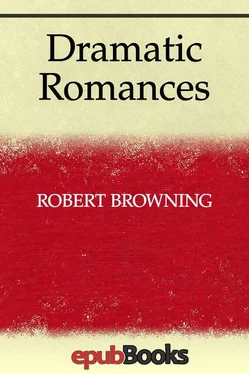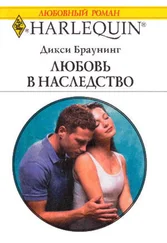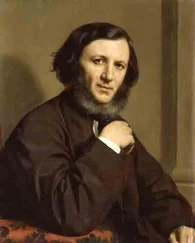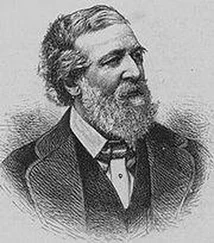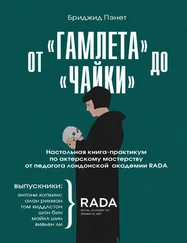Роберт Браунинг - Dramatic Romances
Здесь есть возможность читать онлайн «Роберт Браунинг - Dramatic Romances» весь текст электронной книги совершенно бесплатно (целиком полную версию без сокращений). В некоторых случаях можно слушать аудио, скачать через торрент в формате fb2 и присутствует краткое содержание. Год выпуска: 2014, Издательство: epubBooks Classics, Жанр: Поэзия, на английском языке. Описание произведения, (предисловие) а так же отзывы посетителей доступны на портале библиотеки ЛибКат.
- Название:Dramatic Romances
- Автор:
- Издательство:epubBooks Classics
- Жанр:
- Год:2014
- ISBN:нет данных
- Рейтинг книги:3 / 5. Голосов: 1
-
Избранное:Добавить в избранное
- Отзывы:
-
Ваша оценка:
- 60
- 1
- 2
- 3
- 4
- 5
Dramatic Romances: краткое содержание, описание и аннотация
Предлагаем к чтению аннотацию, описание, краткое содержание или предисловие (зависит от того, что написал сам автор книги «Dramatic Romances»). Если вы не нашли необходимую информацию о книге — напишите в комментариях, мы постараемся отыскать её.
Dramatic Romances — читать онлайн бесплатно полную книгу (весь текст) целиком
Ниже представлен текст книги, разбитый по страницам. Система сохранения места последней прочитанной страницы, позволяет с удобством читать онлайн бесплатно книгу «Dramatic Romances», без необходимости каждый раз заново искать на чём Вы остановились. Поставьте закладку, и сможете в любой момент перейти на страницу, на которой закончили чтение.
Интервал:
Закладка:
NOTES:
"The Glove" gives a transcript from Court life, in Paris, under Francis I. In making Ronsard the mouthpiece for a deeper observation of the meaning of the incident he is supposed to witness and describe than Marot and the rest saw, characteristic differences between these two poets of the time are brought out, the genuineness of courtly love and chivalry is tested, and to the original story of the glove is added a new view of the lady's character; a sketch of her humbler and truer lover, and their happiness; and a pendent scene showing the courtier De Lorges, having won a beauty for his wife, in the ignominious position of assisting the king to enjoy her favors and of submitting to pleasantries upon his discomfiture. The original story as told by Poullain de St. Croix in his Essais Historiques sur Paris ran thus: "One day whilst Francis I amused himself with looking at a combat between his lions, a lady, having let her glove drop, said to De Lorges, 'If you would have me believe that you love me as much as you swear you do, go and bring back my glove.' De Lorges went down, picked up the glove from amidst the ferocious beasts, returned, and threw it in the lady's face; and in spite of all her advances and cajoleries would never look at her again.'' Schiller running across this anecdote of St. Croix, in 1797, as he writes Goethe, wrote a poem on it which adds nothing to the story. Leigh Hunt's 'The Glove and the Lions' adds some traits. It characterizes the lady as shallow and vain, with smiles and eyes which always seem'd the same.'' She calculates since "king, ladies, lovers, all look on," that "the occasion is divine" to drop her glove and "prove his love, then look at him and smile"; and after De Lorges has returned and thrown the glove, "but not with love, right in the lady's face,'' Hunt makes the king rise and swear "rightly done! No love, quoth he, but vanity, sets love a task like that!'' This is the material Browning worked on; he makes use of this speech of the king's, but remodels the lady's character wholly, and gives her an appreciative lover, and also a keen–eyed young poet to tell her story afresh and to reveal through his criticism the narrowness of the Court and the Court poets.
12. Naso: Ovid. Love of the classics and curiosity as to human nature were both characteristic of Peter Ronsard (1524–1585), at one time page to Francis I, the most erudite and original of French medieval poets.
45. Clement Marot: (1496–1544), Court poet to Francis I. His nature and verse were simpler than Ronsard's, and he belonged more peculiarly to his own day.
48. Versifies David: Marot was suspected of Protestant leanings which occasioned his imprisonment twice, and put him in need of the protection Francis and his sister gave him. Among his works were sixty–five epistles addressed to grandees, attesting his courtiership, and the paraphrase of forty–nine of the Psalms to which Ronsard alludes.
50. Illum Juda, etc.: that lion of the tribe of Judah.
89. Venienti, etc.: Meet the coming disease; that is, if evil be anticipated, don't wait till it seizes you, but dare to assure yourself and then forestall it as the lady did.
190. Theorbo: an old Italian stringed instrument such as pages used.
Time's Revenges
I've a Friend, over the sea;
I like him, but he loves me.
It all grew out of the books I write;
They find such favour in his sight
That he slaughters you with savage looks
Because you don't admire my books.
He does himself though,—and if some vein
Were to snap tonight in this heavy brain,
To–morrow month, if I lived to try,
Round should I just turn quietly, 10
Or out of the bedclothes stretch my hand
Till I found him, come from his foreign land
To be my nurse in this poor place,
And make my broth and wash my face
And light my fire and, all the while,
Bear with his old good–humoured smile
That I told him "Better have kept away
Than come and kill me, night and day,
With, worse than fever throbs and shoots,
The creaking of his clumsy boots." 20
I am as sure that this he would do,
As that Saint Paul's is striking two.
And I think I rather…woe is me!
—Yes, rather would see him than not see,
If lifting a hand could seat him there
Before me in the empty chair
To–night, when my head aches indeed,
And I can neither think nor read
Nor make these purple fingers hold
The pen; this garret's freezing cold! 30
And I've a Lady—there he wakes,
The laughing fiend and prince of snakes
Within me, at her name, to pray
Fate send some creature in the way
Of my love for her, to be down–torn,
Upthrust and outward–borne,
So I might prove myself that sea
Of passion which I needs must be!
Call my thoughts false and my fancies quaint
And my style infirm and its figures faint, 40
All the critics say, and more blame yet,
And not one angry word you get.
But, please you, wonder I would put
My cheek beneath that lady's foot
Rather than trample under mine
That laurels of the Florentine,
And you shall see how the devil spends
A fire God gave for other ends!
I tell you, I stride up and down
This garret, crowned with love's best crown, 50
And feasted with love's perfect feast,
To think I kill for her, at least,
Body and soul and peace and fame,
Alike youth's end and manhood's aim,
—So is my spirit, as flesh with sin,
Filled full, eaten out and in
With the face of her, the eyes of her,
The lips, the little chin, the stir
Of shadow round her mouth; and she
—I'll tell you,—calmly would decree 60
That I should roast at a slow fire,
If that would compass her desire
And make her one whom they invite
To the famous ball to–morrow night.
There may be heaven; there must be hell;
Meantime, there is our earth here—well!
NOTES:
"Time's Revenges." An author soliloquizes in his garret over the fact that he possesses a friend who loves him and would do anything in his power to serve him, but for whom he cares almost nothing. At the same time he himself loves a woman to such distraction that he counts himself crowned with love's best crown while sacrificing his soul, his body, his peace, and his fame in brooding on his love, while she could calmly decree that he should roast at a slow fire if it would compass her frivolously ambitious designs. Thus his indifference to his friend is avenged by the indifference the lady shows toward him.
46. The Florentine: Dante. Used here, seemingly, as a symbol of the highest attainments in poesy, his (the speaker's) reverence for which is so great that he would rather put his cheek under his lady's foot than that poetry should suffer any indignity at his hands; yet in spite of all the possibilities open to him through his enthusiasm for poetry, he prefers wasting his entire energies upon one unworthy of him.
The Italian in England
That second time they hunted me
From hill to plain, from shore to sea,
And Austria, hounding far and wide
Her blood–hounds thro' the country–side,
Breathed hot and instant on my trace,—
I made six days a hiding–place
Of that dry green old aqueduct
Where I and Charles, when boys, have plucked
The fire–flies from the roof above,
Bright creeping thro' the moss they love: 10
—How long it seems since Charles was lost!
Six days the soldiers crossed and crossed
The country in my very sight;
And when that peril ceased at night,
The sky broke out in red dismay
With signal fires; well, there I lay
Close covered o'er in my recess,
Up to the neck in ferns and cress,
Thinking on Metternich our friend,
And Charles's miserable end, 20
And much beside, two days; the third,
Hunger overcame me when I heard
The peasants from the village go
To work among the maize; you know,
With us in Lombardy, they bring
Provisions packed on mules, a string
With little bells that cheer their task,
And casks, and boughs on every cask
To keep the sun's heat from the wine;
These I let pass in jingling line, 30
And, close on them, dear noisy crew,
The peasants from the village, too;
For at the very rear would troop
Their wives and sisters in a group
To help, I knew. When these had passed,
I threw my glove to strike the last,
Taking the chance: she did not start,
Much less cry out, but stooped apart,
One instant rapidly glanced round,
And saw me beckon from the ground. 40
A wild bush grows and hides my crypt;
She picked my glove up while she stripped
A branch off, then rejoined the rest
With that; my glove lay in her breast.
Then I drew breath; they disappeared:
It was for Italy I feared.
An hour, and she returned alone
Exactly where my glove was thrown.
Meanwhile came many thoughts: on me
Rested the hopes of Italy. 50
I had devised a certain tale
Which, when 'twas told her, could not fail
Persuade a peasant of its truth;
I meant to call a freak of youth
This hiding, and give hopes of pay,
And no temptation to betray.
But when I saw that woman's face,
Its calm simplicity of grace,
Our Italy's own attitude
In which she walked thus far, and stood, 60
Planting each naked foot so firm,
To crush the snake and spare the worm—
At first sight of her eyes, I said,
"I am that man upon whose head
They fix the price, because I hate
The Austrians over us: the State
Will give you gold—oh, gold so much!
If you betray me to their clutch,
And be your death, for aught I know,
If once they find you saved their foe. 70
Now, you must bring me food and drink,
And also paper, pen and ink,
And carry safe what I shall write
To Padua, which you'll reach at night
Before the duomo shuts; go in,
And wait till Tenebrae begin;
Walk to the third confessional,
Between the pillar and the wall,
And kneeling whisper, Whence comes peace?
Say it a second time, then cease; 80
And if the voice inside returns,
From Christ and Freedom; what concerns
The cause of Peace?—for answer, slip
My letter where you placed your lip;
Then come back happy we have done
Our mother service—I, the son,
As you the daughter of our land!"
Three mornings more, she took her stand
In the same place, with the same eyes:
I was no surer of sun–rise 90
Than of her coming. We conferred
Of her own prospects, and I heard
She had a lover—stout and tall,
She said—then let her eyelids fall,
"He could do much"—as if some doubt
Entered her heart,—then, passing out
"She could not speak for others, who
Had other thoughts; herself she knew,"
And so she brought me drink and food.
After four days, the scouts pursued 100
Another path; at last arrived
The help my Paduan friends contrived
To furnish me: she brought the news.
For the first time I could not choose
But kiss her hand, and lay my own
Upon her head—"This faith was shown
To Italy, our mother; she
Uses my hand and blesses thee."
She followed down to the sea–shore;
I left and never saw her more. 110
How very long since I have thought
Concerning—much less wished for—aught
Beside the good of Italy,
For which I live and mean to die!
I never was in love; and since
Charles proved false, what shall now convince
My inmost heart I have a friend?
However, if I pleased to spend
Real wishes on myself—say, three—
I know at least what one should be. 120
I would grasp Metternich until
I felt his red wet throat distil
In blood thro' these two hands. And next,
—Nor much for that am I perplexed—
Charles, perjured traitor, for his part,
Should die slow of a broken heart
Under his new employers. Last
—Ah, there, what should I wish? For fast
Do I grow old and out of strength.
If I resolved to seek at length 130
My father's house again, how scared
They all would look, and unprepared!
My brothers live in Austria's pay
—Disowned me long ago, men say;
And all my early mates who used
To praise me so–perhaps induced
More than one early step of mine—
Are turning wise: while some opine
"Freedom grows license," some suspect
"Haste breeds delay," and recollect 140
They always said, such premature
Beginnings never could endure!
So, with a sullen "All's for best,"
The land seems settling to its rest.
I think then, I should wish to stand
This evening in that dear, lost land,
Over the sea the thousand miles,
And know if yet that woman smiles
With the calm smile; some little farm
She lives in there, no doubt: what harm 150
If I sat on the door–side bench,
And, while her spindle made a trench
Fantastically in the dust,
Inquired of all her fortunes—just
Her children's ages and their names,
And what may be the husband's aims
For each of them. I'd talk this out,
And sit there, for an hour about,
Then kiss her hand once more, and lay
Mine on her head, and go my way. 160
So much for idle wishing—how
It steals the time! To business now.
Интервал:
Закладка:
Похожие книги на «Dramatic Romances»
Представляем Вашему вниманию похожие книги на «Dramatic Romances» списком для выбора. Мы отобрали схожую по названию и смыслу литературу в надежде предоставить читателям больше вариантов отыскать новые, интересные, ещё непрочитанные произведения.
Обсуждение, отзывы о книге «Dramatic Romances» и просто собственные мнения читателей. Оставьте ваши комментарии, напишите, что Вы думаете о произведении, его смысле или главных героях. Укажите что конкретно понравилось, а что нет, и почему Вы так считаете.
